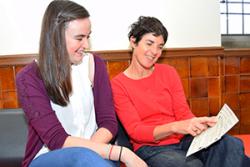Positive Psychology project aims to improve work place wellbeing and individuals job prospects in Rhyl
In a world where most of us spend a large part of our lives at work, we need to create environment that fosters productivity, motivation and in-work support. A student at Bangor University has been given just this task. Kate Isherwood, a PhD student in the School of Psychology will be researching the use of Positive Psychology and Behaviour Change techniques, in the workplace, under the supervision of Professor John Parkinson.
 Kate and Alison Thomas of Rhyl City Strategy discuss some of the materials Kate has produced.Under a Knowledge Economy Skills Scholarship, Kate will partner with Rhyl City Strategy (RCS), to gain real-world experience alongside valuable research experience, co-designing her PhD studies and implementing them in the real world.
Kate and Alison Thomas of Rhyl City Strategy discuss some of the materials Kate has produced.Under a Knowledge Economy Skills Scholarship, Kate will partner with Rhyl City Strategy (RCS), to gain real-world experience alongside valuable research experience, co-designing her PhD studies and implementing them in the real world.
Kate is one of the first to receive funding under a new KESS 2 programme led by Bangor University on behalf of the Welsh Higher Education Sector. KESS2 focuses on development within the European Convergence Programme. They offer Research Masters and PhD students the opportunity to be linked to a company partner, with scholarships supported by the European Social Fund. A previous successful KESS round helped students in Wales achieve 230 PhDs and 223 Research Masters projects.
Kate said: “I am privileged to be one of few students given the opportunity to develop a real-world impact for my research. It is fantastic to be able to carry out research into positive mental health and workplace productivity, with interventions that are simple and which we can use every day. Things such as keeping a three good things diary where we think of three good things that happened that day.
Having started my research in May, I am thoroughly enjoying researching into the world of motivation and mental health issues, and am constantly seeking innovative methodologies that I can implement in addressing real population challenges.”
Positive Psychology is an emerging field which looks at improving individual’s resilience, building one’s level of positive qualities, and promoting overall quality of life. Rather than specifically treating mental ill-health, the focus is on personal growth and illness prevention. Kate will look into improving workplace well-being by researching topics including motivation, overcoming challenges, and emotion regulation.
Kate will be working alongside RCS, a local not-for-profit organisation which designs and delivers services to help people overcome barriers to employment such as health conditions. Kate will be working with RCS to develop a range of positive psychology interventions to boost people’s chances of finding and sustaining employment through improving resilience and motivation.
She is working under the supervision of Professor John Parkinson, Head of School of Psychology, Bangor University who said: “The KESS programme enables knowledge exchange between the university and the community. We’re developing a long-term relationship with Rhyl City Strategy which is allowing us to hone our psychological interventions so that they are effective in helping with the needs of the local population.”
Kate will also work closely with RCS Operational Director, Alison Thomas, who said: “we are delighted to be working with Kate and colleagues at Bangor University in this promising area of research and are extremely excited about the potential of these simple interventions to make a real difference to people’s lives”
Publication date: 10 November 2016
